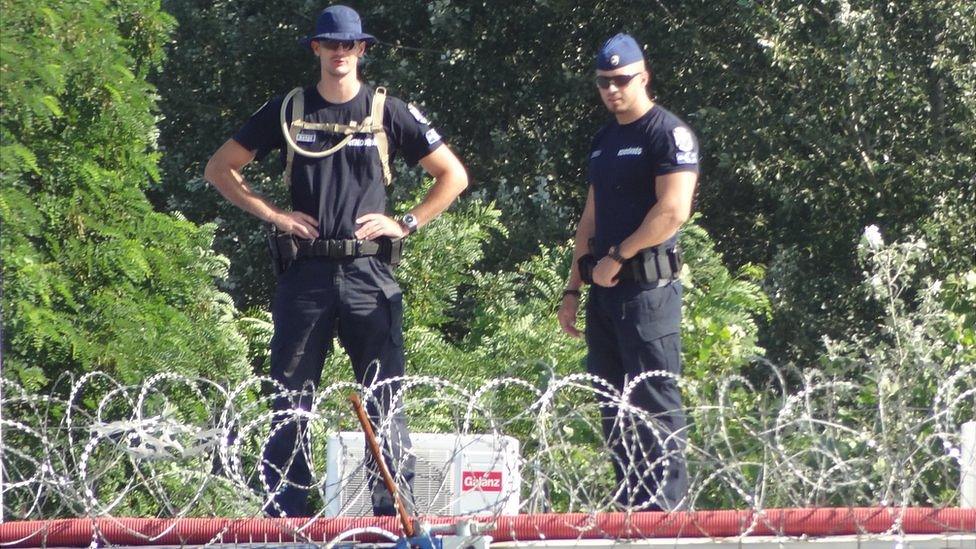Hungary hits snags with squad to stop migrants
- Published
Hungary recruiting 'border-hunters'
A new police unit in Hungary, launched to reinforce patrols along the 175km (110-mile) border fence with Serbia, is struggling to find suitable candidates despite a massive recruitment drive.
Many fail the psychology test, one of several designed to weed out inappropriate applicants.
Several YouTube videos with a recruitment theme have disabled all comments. Where comments are still possible, one failed applicant complained that visible tattoos were a criterion for rejection.
Xenophobia is at record levels in Hungary, after two years of anti-migrant rhetoric from the conservative Fidesz government.
Work is continuing on a second, electronic fence parallel to the first, designed to prevent illegal entry. Hungary now accepts only 10 applicants for asylum a day from Serbia, where up to 7,000 asylum seekers are waiting for the chance to move on to western Europe.
Under new legislation, all asylum seekers will be kept in detention while their applications are considered, to prevent them absconding across the western border into Austria.
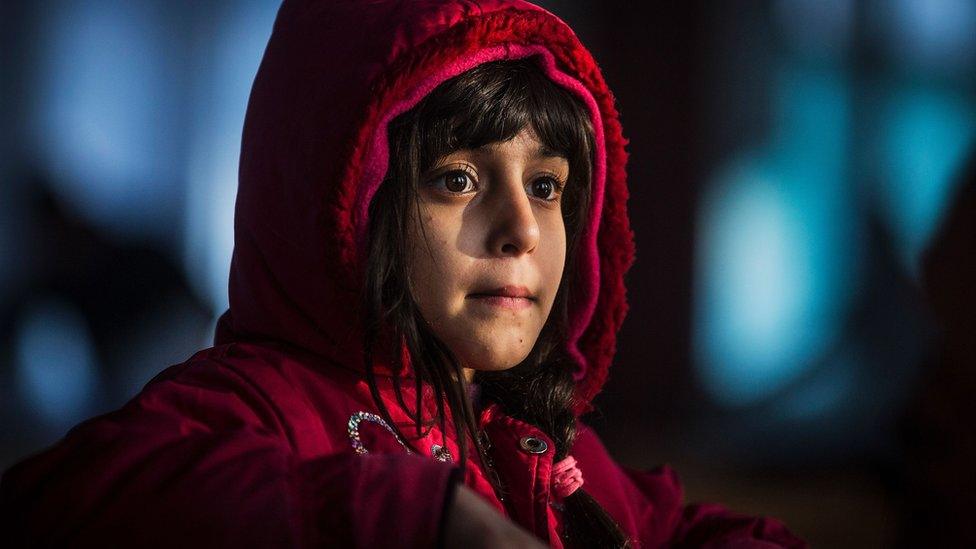
Hungary's effective sealing of the border has left some 7,000 migrants, including this Afghan girl, stuck in Serbia
There is no lack of interest in joining the new "border-hunters" unit. But police officers admit privately that the name is part of the problem, as it attracts the wrong kind of applicant.
Only 1,000 of the 2,700 people who applied from last August to January this year were accepted. Nearly 400 failed the psychology test, police told the BBC. Police commanders say quality is more important than quantity, and they will keep recruiting for as long as necessary.
Balkans lockdown
The formation of the 3,000-strong unit, part of the national police, was announced in August 2015. It is designed to take the pressure off the regular police, 18,000 of whom served on the Serbian border at different times last year, alongside 6,000 soldiers.
The border-hunters receive normal police training, including firearms use, with extra modules about Islam and other cultures they might come into contact with.
Because of the EU-Turkey deal, external of March 2016, and the deterrent effect of police measures in Bulgaria, Macedonia, Serbia and Hungary, the earlier flow of refugees through the West Balkan route has slowed to a trickle. This is largely tolerated by most countries, but Hungary spares no expense to block it.
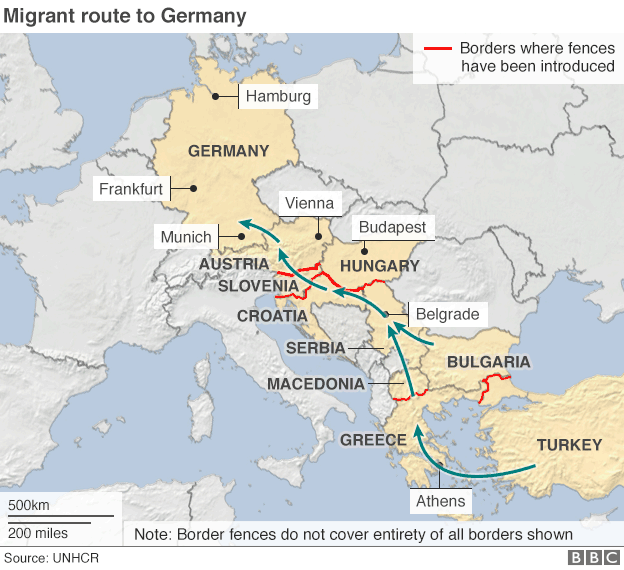
In January an average 80 migrants were caught each night trying to enter Hungary, two-thirds after successfully climbing or cutting through the fence. They were then "escorted" by police back to the gates, and sent back into Serbia.
The UN refugee agency UNHCR and human rights groups allege this push-back practice is illegal, external, and have gathered evidence alleging excessive use of force by the Hungarian police. Hungary granted just 427 asylum requests in 2016.
UN criticises Hungary over border controls
Hungary MEP suggests using pig heads to deter refugees
In the border-hunters classroom at Barcs in southern Hungary, 30 uniformed male and female police cadets practise arrest techniques.
Working in pairs, they twist the arms of their partners behind their backs and march them across the room, bent double.
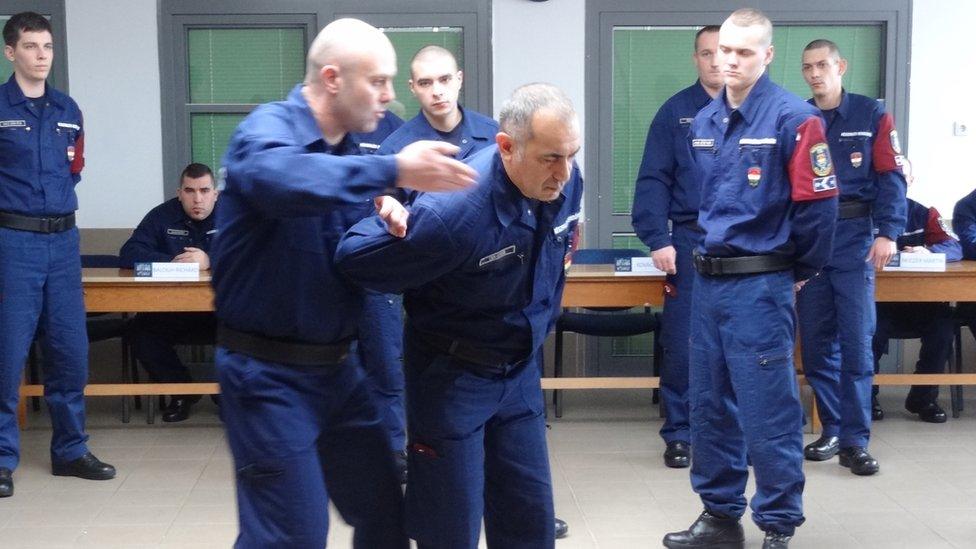
Only one-third of the target number of border-hunters has been recruited
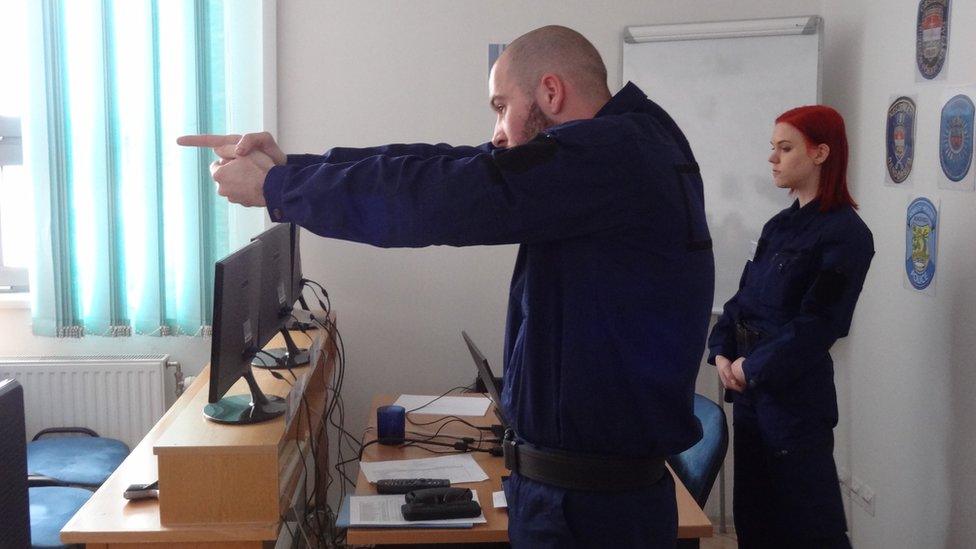
Police chiefs say the border-hunters are not vigilantes - they will have to maintain high standards
"We don't hunt down anyone, migrants or others," Hungarian police chief Karoly Papp told the BBC. "The police have to keep strictly and humanely to the rules laid down in the Hungarian constitution, the police law, and the [EU] Schengen border regulations.
"Of course there are some to whom we say, 'We cannot let you into the training course, because you are not suitable for a career in the police.' And there are others who would be suitable, but at the last minute have second thoughts."
"I always wanted to join the police, but until now, the opportunity didn't present itself," said Adrienn Heronyanyi, who has a four-year-old son. "The psychological and medical tests were hard, but I'm happy I passed."
She took her oath, with 531 other recruits, at a swearing-in ceremony in Budapest on 12 January.
'We cannot yield'
"Terrorist attacks, violence and crime, ethnic and cultural clashes all warn us," Prime Minister Viktor Orban told the recruits, "that those who come here do not want to live our way of life. They want to continue their own ways of life - but with the standard of living of the people of Europe.
"We know that the migrants are also victims. Victims of the people-smugglers; victims of European politicians who promise admission and invitation; and victims of their own illusions. We understand them, but we cannot yield to their demands, and we cannot let them into Europe."
According to the State Prosecution Service, nine police officers are currently under investigation for alleged violence against migrants. For the chief of police, this is proof that such behaviour is the exception, not the rule.
"I will defend my officers against every unprincipled attack, but at the same time I refuse to defend anyone who does not keep to the high standards of the Hungarian police," said Karoly Papp.
- Published2 September 2016
